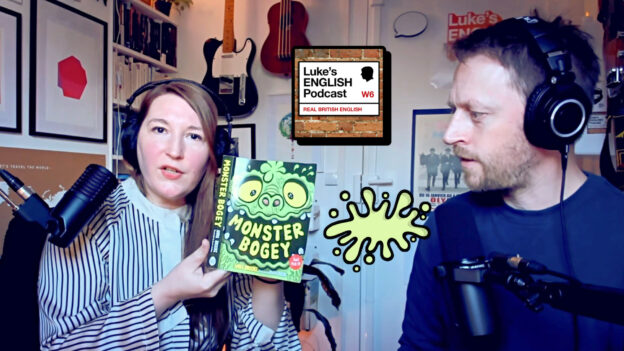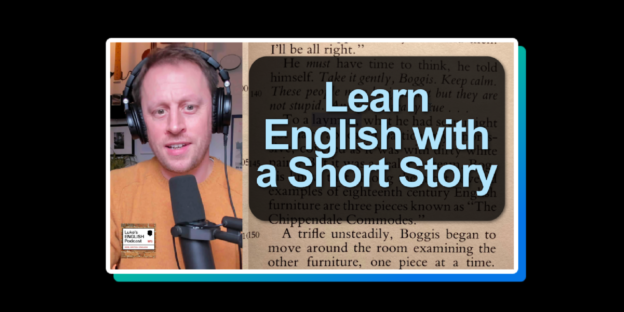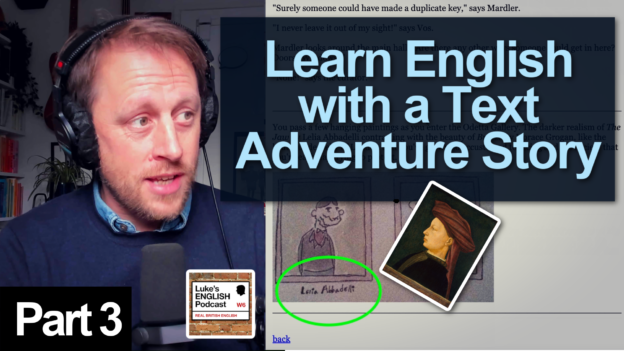Let me read you a classic Sherlock Holmes detective story, by Sir Arthur Conan Doyle. I’ll read the original text and stop regularly in order to explain what is happening.


Let me read you a classic Sherlock Holmes detective story, by Sir Arthur Conan Doyle. I’ll read the original text and stop regularly in order to explain what is happening.

Amber returns to the podcast to tell us some grisly stories about the history of Paris. Amber is a bit of an expert about Paris. She has read pretty much every book about the city and is also a registered tour guide here. A few years ago she set up a podcast called Paname Podcast (Paname is a nickname for Paris). Each episode contains a true story from history, with tales of battle, execution, romance, tragedy and adventure. You can get it where you get your podcasts. In this episode Amber comes onto LEP to share a few stories from her podcast series. Includes a 30-minute ramble at the end of the episodes.



Is that a confusing title? Hopefully not. As you might expect, it’s a little summary of what’s included in the episode. To give you some more details, Alastair Budge is the host of a podcast called “English Learning for Curious Minds” and he has created a new audio drama for English learners called “Pioneers of the Continuum”. It’s a time-travel adventure for English learners, and Alastair asked me to be the narrator for episode 1. In this episode of LEP, we talk about Alastair’s story, living in Malta, learning English by immersion, cliches and complaints from English speakers visiting Paris and Alastair’s story about playing the bagpipes on the streets of Paris. The audio version includes 30+mins of rambling from me at the end. Enjoy!



My friend Anna has written a book for children (7+) which has a full publishing contract and is available in all good bookshops now. The book tells the story of a boy who accidentally creates a monster when his secret collection of nose bogeys gets struck by lightning! This conversation includes lots of talk of snot and bogeys, as well as stories from Anna’s time as a travel writer.


James Harris is a writer, comedian, English teacher and language learner (French, German, Chinese) from England. In this funny chat, we talk about learning Chinese, being married to a Chinese woman and his semi-autobiographical book, “Midlands” which tells several funny and touching stories about two ex-pats living in Germany; Stuart, who is a stand-up comedian trying to understand the Germans, and Doug who gets involved in a love affair. James reads several passages from the book during the episode.
Stuart describes his early days in Germany, learning German.
Then a chance meeting in a pub had earned him an invitation to Berlin. Laura, Danish and short, was staying there for the summer, rummaging around in the archives for information about a particular Jewish family who had gone on to achieve cultural success in post-war Denmark;
Laura, a snub-nosed Danish girl with glasses who loved Israel and wheat beer. Stuart didn’t care much about her interests but did enjoy spending the days reading on her balcony and socializing with university friends at night;
by the end of the summer his hair had lengthened and his German increased fifty-fold, meaning he now knew about a hundred words. ‘Hallo!’ he would say, then ‘Weltschmerz’ and following a further pause ‘Auf Wiedersehen,’ saying a final farewell to people he would see again the next day.
He also hadn’t yet learnt to ask whether something was sugar or salt, leading to an evening eating some very sweet chips. But even speechless he wasn’t, at last, uneasy in Berlin – it seemed to him a gentle city, where the trains slid in and out and the open spaces pacified tourists drunker and rowdier elsewhere.
It was like the Germans had become one of the peaceful races in Star Trek, the ones introduced by an insert screen of their orderly, verdant planet, Bajorans, say, or some other species permanently threatened by obliteration; and what a change after the tiny cubicles and traffic-jam living of the English, who could only ever be the Borg.
Surrounded by pacifists, Stuart revelled in the license of Englishness, his ability to voice the odd mildly aggressive opinion or wildly over-celebrate during that summer’s football tournament, until England lost. He swam in lakes, and bought a bicycle, and gradually stopped thinking of England and the ashes it had fed him.
In Oxford, where he had been President of the University sketch revue, people had printed gossip about him in the student newspapers, asked him to leave parties, dealt with him as the man who had committed that deepest and most unforgivable of Oxford crimes: failure.
He had failed, as a comedian and a young man, and now publicly; his country had rejected him. He had been humiliated in front of an audience of his contemporaries and sent into an internal exile.
Afterwards, many of these young dilettantes, at the time apparently picturing future lives as bereft of unforeseen distress as possible, lives composed of simply an endless procession of success, successes occurring within a network of contacts which they had built up at University and which would continue to provide them with unstinting support throughout their adult lives, never violating the simple and essential principle that all was permissible as long as it did well – did not want his name on their social CV.
Stuart is on-stage doing stand up in Germany.
‘Don’t you sometimes get the feeling,’ said Stuart, years before on the stage in Heidelberg, ‘that if Barack Obama had been German it wouldn’t have been “Yes We Can” but ”Nein das geht nicht”? No you can’t.
‘Everyone would have been chanting it – No you can’t! No you can’t! Of course in this version Obama would not have been black.’
Stuart was closing in on the kill. ‘And this very lack of optimism,’ he said, treading across the stage, limbering, into the really good stuff now, ‘is actually built into the German language itself.
Like for example, when you’re really happy in English, you say “I’m on Cloud Nine.” But in Germany you say, “I’m on Cloud Seven.”
Does this mean that even in their happiest moments the Germans are two clouds less happy than English-speaking people?’
And after developing that bit, which meant moving into a depiction of an exemplary German, Hannes, in his German heaven, with an allotment, board games, juice and an Autobahn heading directly to Mallorca, he noting, somewhat wistfully, the celebratory Anglophones on Cloud Nine who were dancing to ‘Video Killed the Radio Star’, which was an excuse to sing it, following which they – the Anglophones – called down to Cloud Eight “Hey Hannes man! Come and join us here on Cloud Nine” and Hannes replying “No thank you. Everything on Cloud Seven is perfectly satisfactory” then moving on to speculation as to the occupants of the other clouds, the French on Cloud Eight living it up, their motor scooters floating off the cloud and down to Cloud Zero where the Greeks were and below them the Cypriots who’d had to sell the cloud, and were just falling – after all these and other jokes, Stuart had them where he wanted them.
‘Isn’t it funny that, since the Second World War, the Germans have been like’, change voice, German accent, ‘”We Germans. We have done so many things wrong and there is no way we can ever put them right.”
And now Greece is like,’ pause, turn of the head, “Well, actually…”’
They laughed, and laughed, and laughed. They got it.

The third (and final) adventure in this series of mini-mysteries on LEP. Can I improve my detective skills to work out the disappearance of a priceless painting and a series of gruesome murders? Story by Peter Carlson and available on textadventures.co.uk

The second in a trilogy of text adventure stories by Peter Carlson. In this one we are chasing a ghostly serial killer with a few tricks up his sleeve. Do I have the detective skills to solve the mystery and avoid certain death?

Let’s do another text adventure mystery story by Peter Carlson. Listen to me read the story and make choices to solve the mystery. You can read the story with me (link below) or do the game yourself later. This is the first in a series of 3 stories from Peter’s “Victorian Detective Interlude” game on textadventures.co.uk
If you have recently subscribed to LEP Premium – www.teacherluke.co.uk/premium
The best way to use LEP Premium is to add the episodes to a normal podcast app on your phone (not the LEP App, it’s not updating any more 😢, and not Spotify because it isn’t “normal”). Read this page for some important information to help you get started https://teacherluke.co.uk/premium/how-to-add-lep-premium-to-a-podcast-app-on-your-phone-with-acast/